Former National Security Agency contractor Edward Snowden has written a memoir, telling his life story in detail for the first time and explaining why he chose to risk his freedom to become perhaps the most famous whistleblower of all time.
Snowden, who now lives in Russia to avoid arrest under the U.S. Espionage Act, says his six years working for the NSA and CIA led him to conclude the U.S. intelligence community "hacked the Constitution" and put everyone's liberty at risk and that he had no choice but to turn to journalists to reveal it to the world.
"I realized that I was crazy to have imagined that the Supreme Court, or Congress, or President Obama, seeking to distance his administration from President George W. Bush's, would ever hold the IC legally responsible — for anything," he writes.
The book, "Permanent Record," is scheduled to be released Tuesday. It offers by far the most expansive and personal account of how Snowden came to reveal secret details about the government's mass collection of Americans' emails, phone calls and Internet activity in the name of national security.
His decision to turn from obscure IC wonk to whistleblower in 2013 set off a national debate about the extent of government surveillance by intelligence agencies desperate to avoid a repeat of the Sept. 11 attacks.
Snowden, who fled first to Hong Kong and then Russia, attempts in his memoir to place his concerns in a contemporary context, sounding the alarm about what he sees as government efforts worldwide to delegitimize journalism, suppress human rights and support authoritarian movements.
"What is real is being purposely conflated with what is fake, through technologies that are capable of scaling that conflation into unprecedented global confusion," he says.
The story traces Snowden's evolution from childhood, from growing up in the 1980s in North Carolina and suburban Washington, where his mother worked as a clerk at the NSA and his father served in the Coast Guard.
He came of age as the Internet evolved from an obscure government computer network and describes how a youthful fascination with technology — as a child, he took apart and reassembled a Nintendo console and, as a teenager, hacked the Los Alamos nuclear laboratory network — eventually led him to a career as an NSA contractor, where he observed high-tech spy powers with increasing revulsion.
Analysts used the government's collection powers to read the emails of current and former lovers and stalk them online, he writes. One particular program the NSA called XKEYSCORE allowed the government to scour the recent Internet history of average Americans. He says he learned through that program that nearly everyone who's been online has at least two things in common: They've all watched pornography at one time, and they've all stored videos and pictures of their family.
"This was true," he writes, "for virtually everyone of every gender, ethnicity, race, and age — from the meanest terrorist to the nicest senior citizen, who might be the meanest terrorist's grandparent, or parent, or cousin."
He struggled to share his concerns with the girlfriend, who joined him in Russia and is now his wife.
"I couldn't tell her that my former co-workers at the NSA could target her for surveillance and read the love poems she texted me. I couldn't tell her that they could access all the photos she took — not just the public photos, but the intimate ones," he writes. "I couldn't tell her that her information was being collected, that everyone's information was being collected, which was tantamount to a government threat: If you ever get out of line, we'll use your private life against you."
Before summoning a small group of journalists to Hong Kong to disclose classified secrets, knowing that a return to the U.S. was impossible, he says he prepared like a man about to die. He emptied his bank accounts, put cash into a steel ammo box for his girlfriend and erased and encrypted his old computers.
Snowden, 36, lives in Moscow, where he remains outside the reach of a U.S. Justice Department that brought Espionage Act charges just weeks after the disclosures. He spends many of his days behind a computer and participating in virtual meetings with fellow board members at the Freedom of the Press Foundation. "I beam myself onto stages around the world" to discuss civil liberties, he writes.
When he does go out, he tries to shake up his appearance, sometimes wearing different glasses. He keeps his head down when he walks past buildings equipped with closed-caption television. He described being recognized once in a Moscow museum and consenting to a selfie request from a teenage girl speaking German-accented English.
The greatest regret of his life, he says, "is my reflexive, unquestioning support" for the wars that followed Sept. 11.
"It was as if whatever institutional politics I'd developed had crashed — the anti-institutional hacker ethos instilled in me online, and the apolitical patriotism I'd inherited from my parents, both wiped from my system — and I'd been rebooted as a willing vehicle of vengeance."
Follow Eric Tucker on Twitter at http://www.twitter.com/etuckerAP
UNITED NATIONS (AP) — The United States vetoed a widely backed U.N. resolution Thursday that would have paved the way for full United Nations membership for Palestine, a goal the Palestinians have long sought and Israel has worked to prevent.
The vote in the 15-member Security Council was 12 in favor, the United States opposed and two abstentions, from the United Kingdom and Switzerland. U.S. allies France, Japan and South Korea supported the resolution.
The strong support the Palestinians received reflects not only the growing number of countries recognizing their statehood but almost certainly the global support for Palestinians facing a humanitarian crisis caused by the war in Gaza, now in its seventh month.
The resolution would have recommended that the 193-member U.N. General Assembly, where there are no vetoes, approve Palestine becoming the 194th member of the United Nations. Some 140 countries have already recognized Palestine, so its admission would have been approved, likely by a much higher number of countries.
U.S. deputy ambassador Robert Wood told the Security Council that the veto “does not reflect opposition to Palestinian statehood but instead is an acknowledgment that it will only come from direct negotiations between the parties."
The United States has “been very clear consistently that premature actions in New York — even with the best intentions — will not achieve statehood for the Palestinian people,” deputy State Department spokesman Vedant Patel said.
His voice breaking at times, Palestinian U.N. Ambassador Riyad Mansour told the council after the vote: “The fact that this resolution did not pass will not break our will and it will not defeat our determination.”
“We will not stop in our effort,” he said. “The state of Palestine is inevitable. It is real. Perhaps they see it as far away, but we see it as near.”
This is the second Palestinian attempt for full membership and comes as the war in Gaza has put the more than 75-year-old Israeli-Palestinian conflict at center stage.
Palestinian President Mahmoud Abbas first delivered the Palestinian Authority’s application for U.N. membership in 2011. It failed because the Palestinians didn’t get the required minimum support of nine of the Security Council’s 15 members.
They went to the General Assembly and succeeded by more than a two-thirds majority in having their status raised from a U.N. observer to a non-member observer state in 2012. That opened the door for the Palestinian territories to join U.N. and other international organizations, including the International Criminal Court.
Algerian U.N. Ambassador Amar Bendjama, the Arab representative on the council who introduced the resolution, called Palestine’s admission “a critical step toward rectifying a longstanding injustice" and said that “peace will come from Palestine’s inclusion, not from its exclusion.”
In explaining the U.S. veto, Wood said there are “unresolved questions” on whether Palestine meets the criteria to be considered a state. He pointed to Hamas still exerting power and influence in the Gaza Strip, which is a key part of the state envisioned by the Palestinians.
Wood stressed that the U.S. commitment to a two-state solution, where Israel and Palestine live side-by-side in peace, is the only path for security for both sides and for Israel to establish relations with all its Arab neighbors, including Saudi Arabia.
“The United States is committed to intensifying its engagement with the Palestinians and the rest of the region, not only to address the current crisis in Gaza, but to advance a political settlement that will create a path to Palestinian statehood and membership in the United Nations,” he said.
Mansour, the Palestinian U.N. ambassador, reiterated the commitment to a two-state solution but asserted that Israel believes Palestine "is a permanent strategic threat."
"Israel will do its best to block the sovereignty of a Palestinian state and to make sure that the Palestinian people are exiled away from their homeland or remain under its occupation forever,” he said.
He demanded of the council and diplomats crowded in the chamber: “What will the international community do? What will you do?”
Israeli-Palestinian negotiations have been stalled for years, and Israel’s right-wing government is dominated by hard-liners who oppose Palestinian statehood.
Israeli U.N. Ambassador Gilad Erdan called the resolution “disconnected to the reality on the ground” and warned that it “will cause only destruction for years to come and harm any chance for future dialogue.”
Six months after the Oct. 7 attack by the Hamas militant group, which controlled Gaza, and the killing of 1,200 people in “the most brutal massacre of Jews since the Holocaust,” he accused the Security Council of seeking “to reward the perpetrators of these atrocities with statehood.”
Israel’s military offensive in response has killed over 32,000 Palestinians, according to Gaza’s health ministry, and destroyed much of the territory, which speaker after speaker denounced Thursday.
After the vote, Erdan thanked the United States and particularly President Joe Biden “for standing up for truth and morality in the face of hypocrisy and politics.”
He called the Palestinian Authority — which controls the West Bank and the U.S. wants to see take over Gaza where Hamas still has sway — “a terror supporting entity.”
The Israeli U.N. ambassador referred to the requirements for U.N. membership – accepting the obligations in the U.N. Charter and being a “peace-loving” state.
“How can you say seriously that the Palestinians are peace loving? How?” Erdan asked. “The Palestinians are paying terrorists, paying them to slaughter us. None of their leaders condemns terrorism, nor the Oct. 7 massacre. They call Hamas their brothers.”
Despite the Palestinian failure to meet the criteria for U.N. membership, Erdan said most council members supported it.
“It’s very sad because your vote will only embolden Palestinian rejectionism every more and make peace almost impossible,” he said.
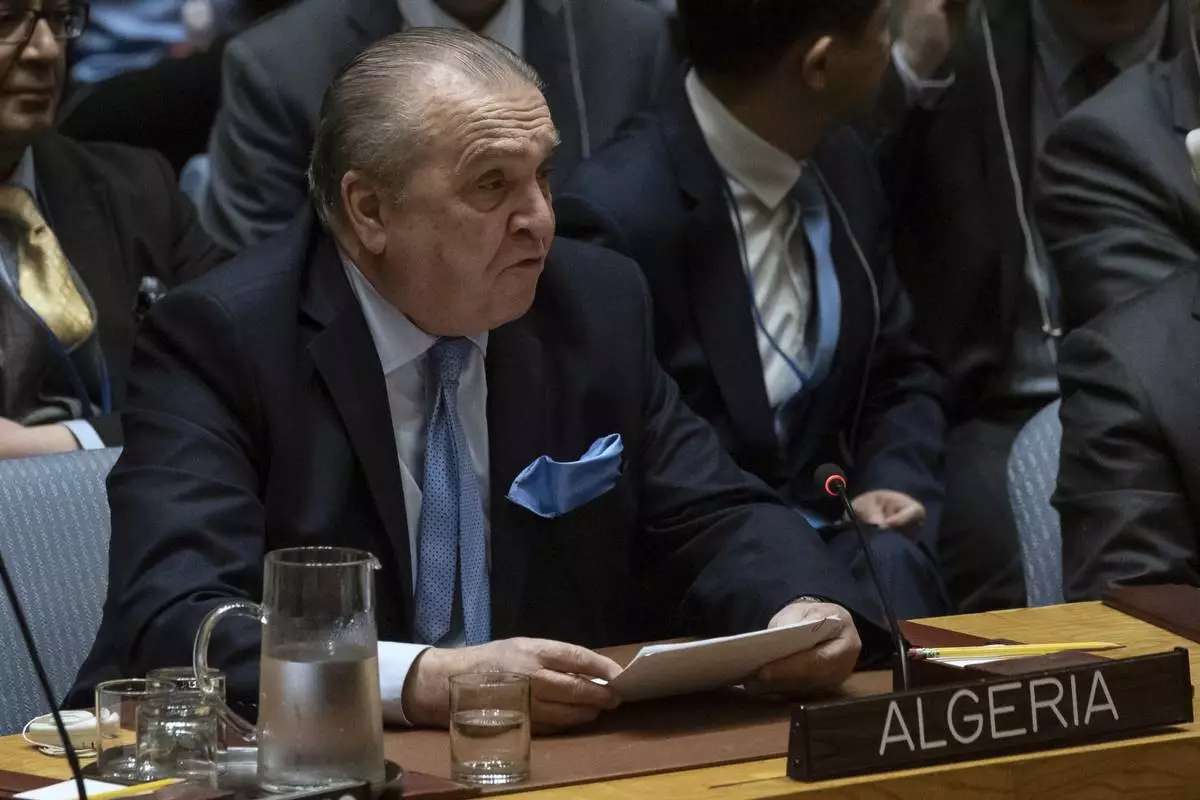
Algeria's Permanent Ambassador to the United Nations Amar Bendjama speaks during a Security Council meeting at United Nations headquarters, Thursday, April 18, 2024. (AP Photo/Yuki Iwamura)
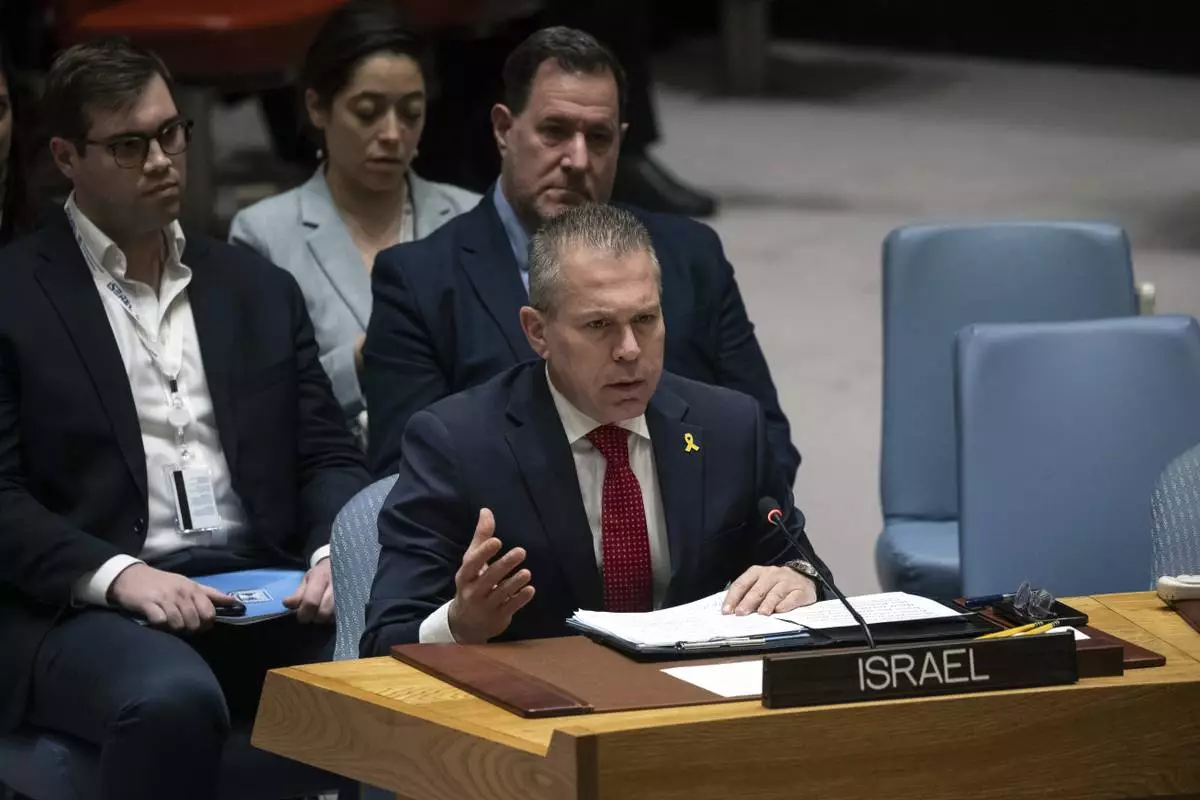
Israeli Ambassador to the United Nations Gilad Erdan speaks during a Security Council meeting at United Nations headquarters, Thursday, April 18, 2024. (AP Photo/Yuki Iwamura)
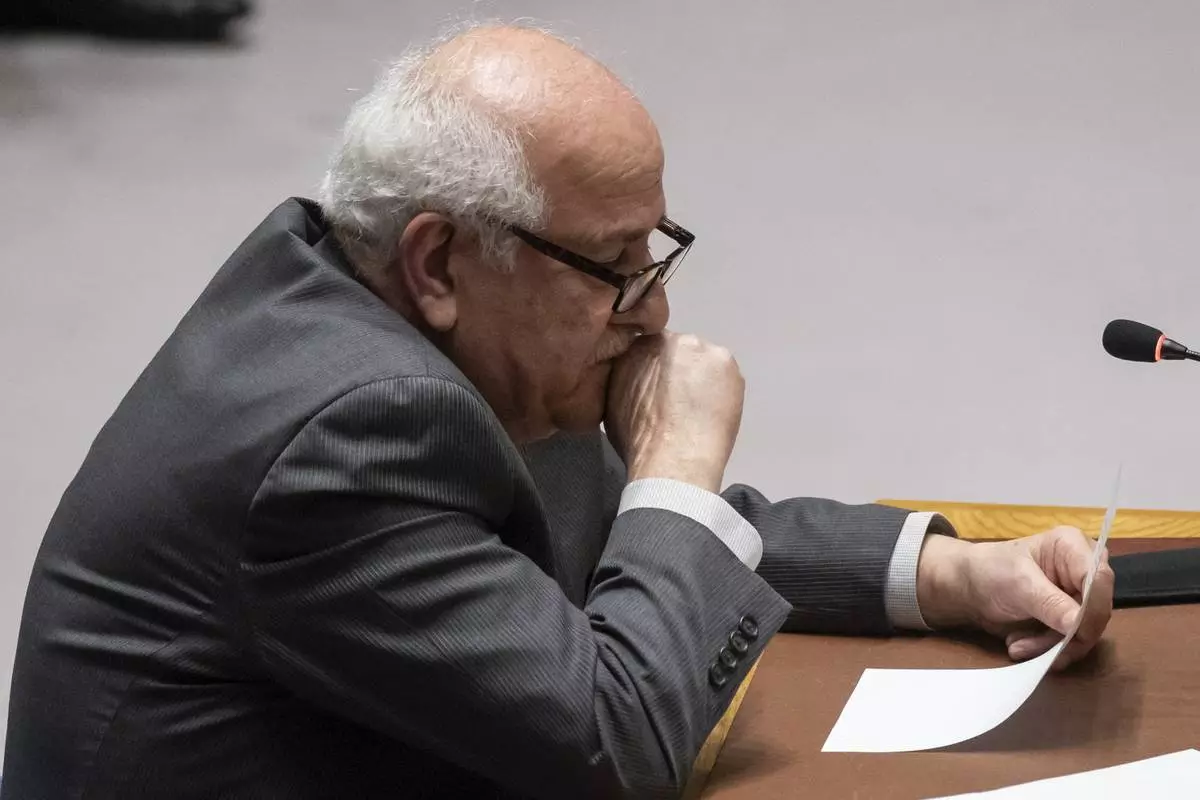
Palestinian Ambassador to the United Nations Riyad Mansour holds tears while speaking during a Security Council meeting at United Nations headquarters, Thursday, April 18, 2024. (AP Photo/Yuki Iwamura)
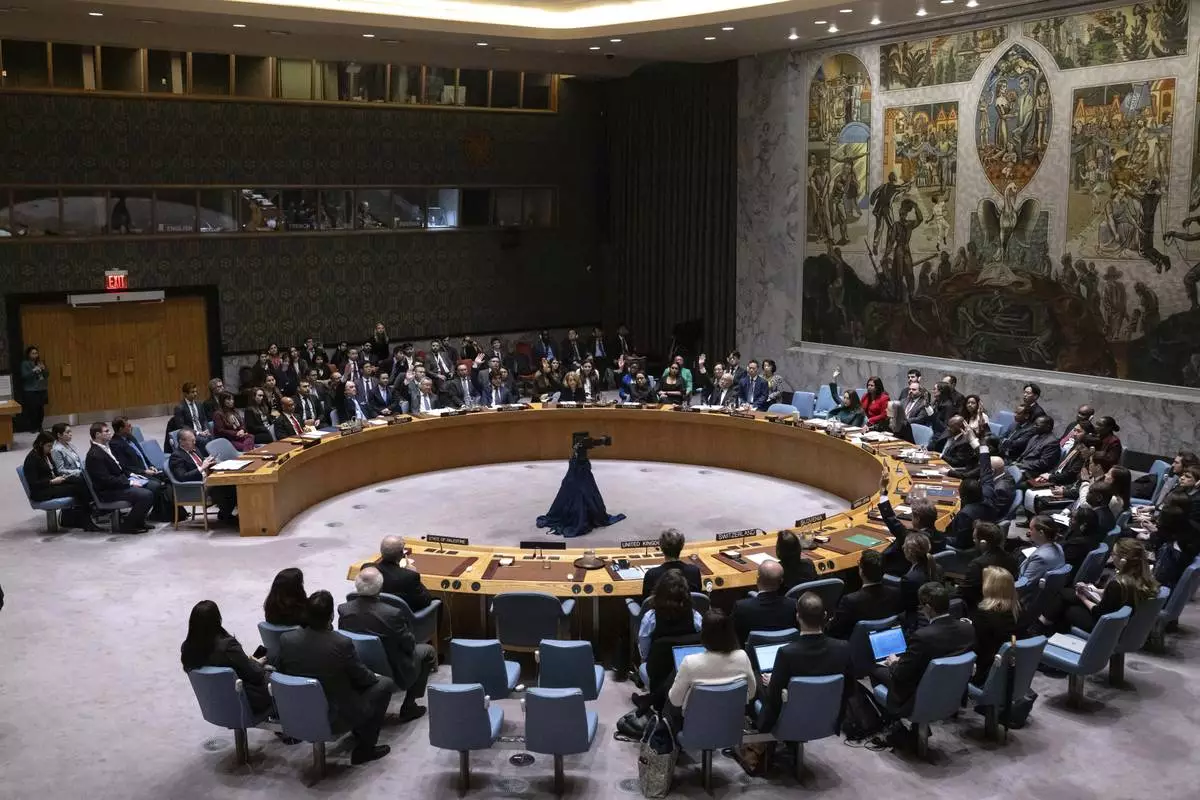
Representatives of member countries take votes during a Security Council meeting at United Nations headquarters, Thursday, April 18, 2024. (AP Photo/Yuki Iwamura)
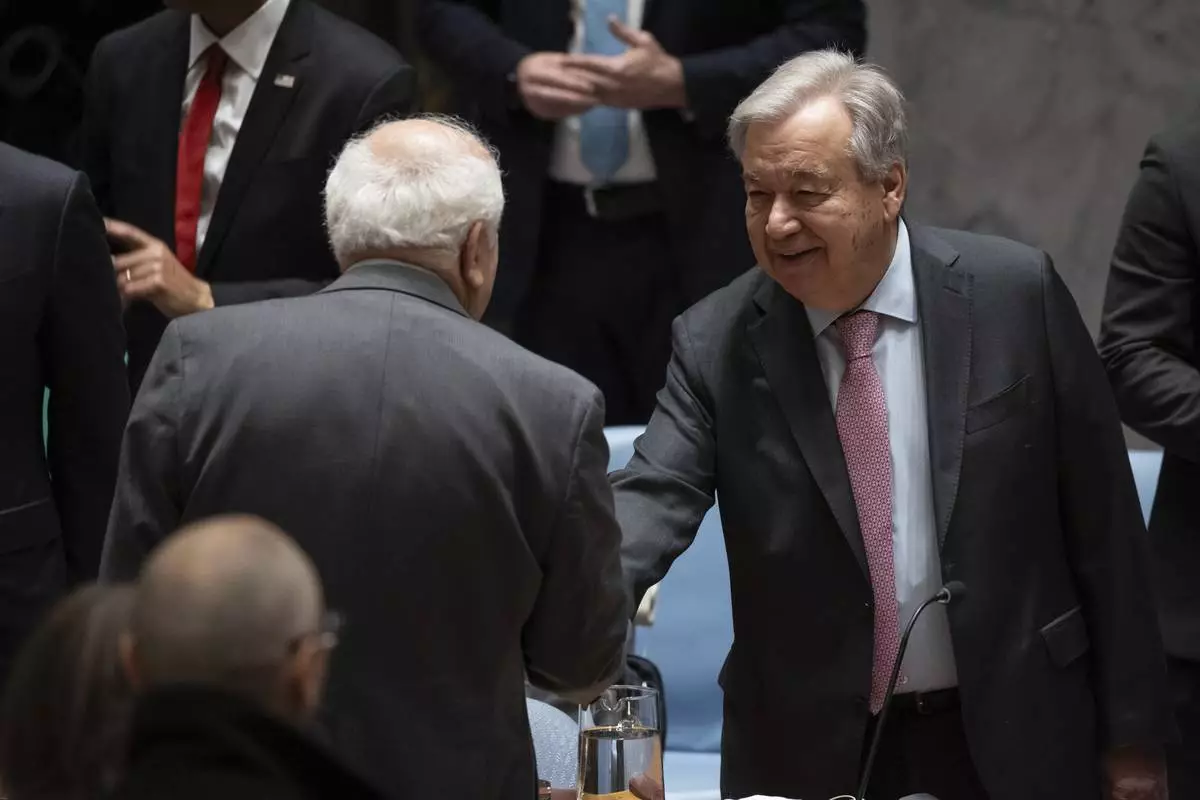
Palestinian Ambassador to the United Nations Riyad Mansour, left, and United Nations Secretary-General Antonio Guterres speak before a Security Council meeting at the United Nations headquarters, Thursday, April 18, 2024. (AP Photo/Yuki Iwamura)
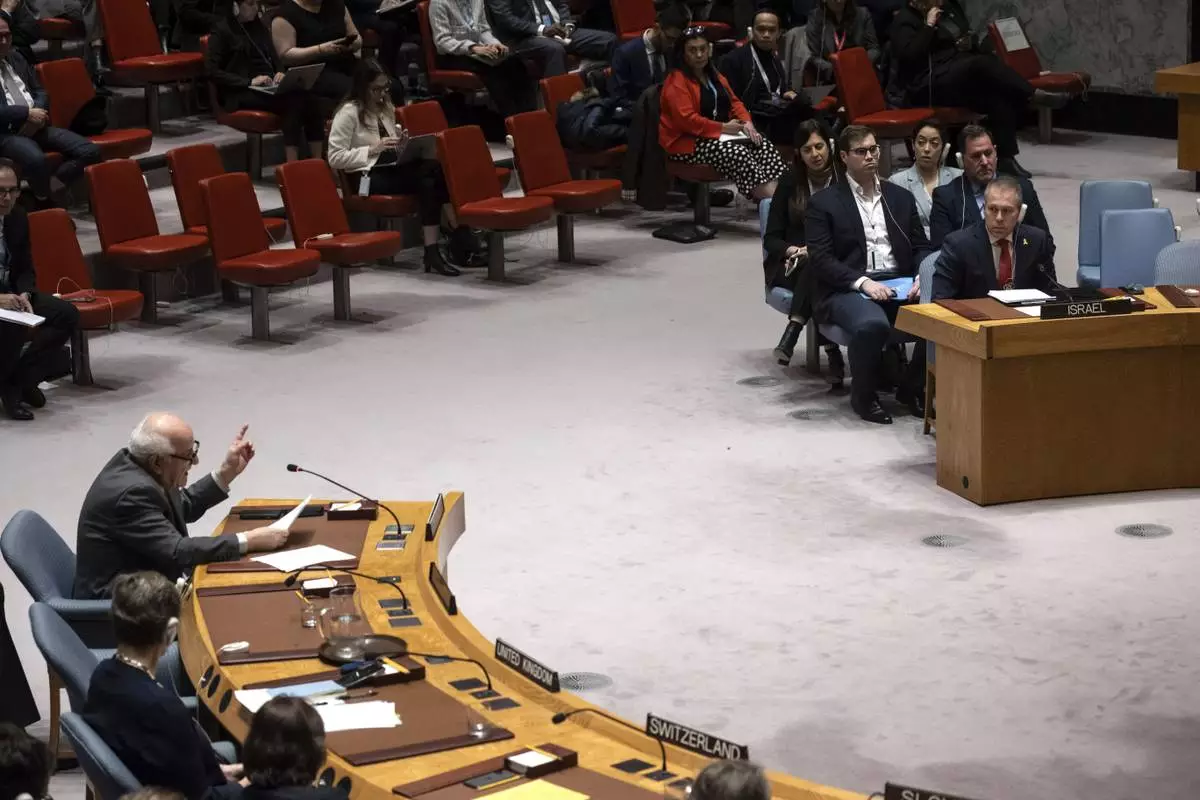
Palestinian Ambassador to the United Nations Riyad Mansour speaks during a Security Council meeting at United Nations headquarters, Thursday, April 18, 2024. (AP Photo/Yuki Iwamura)
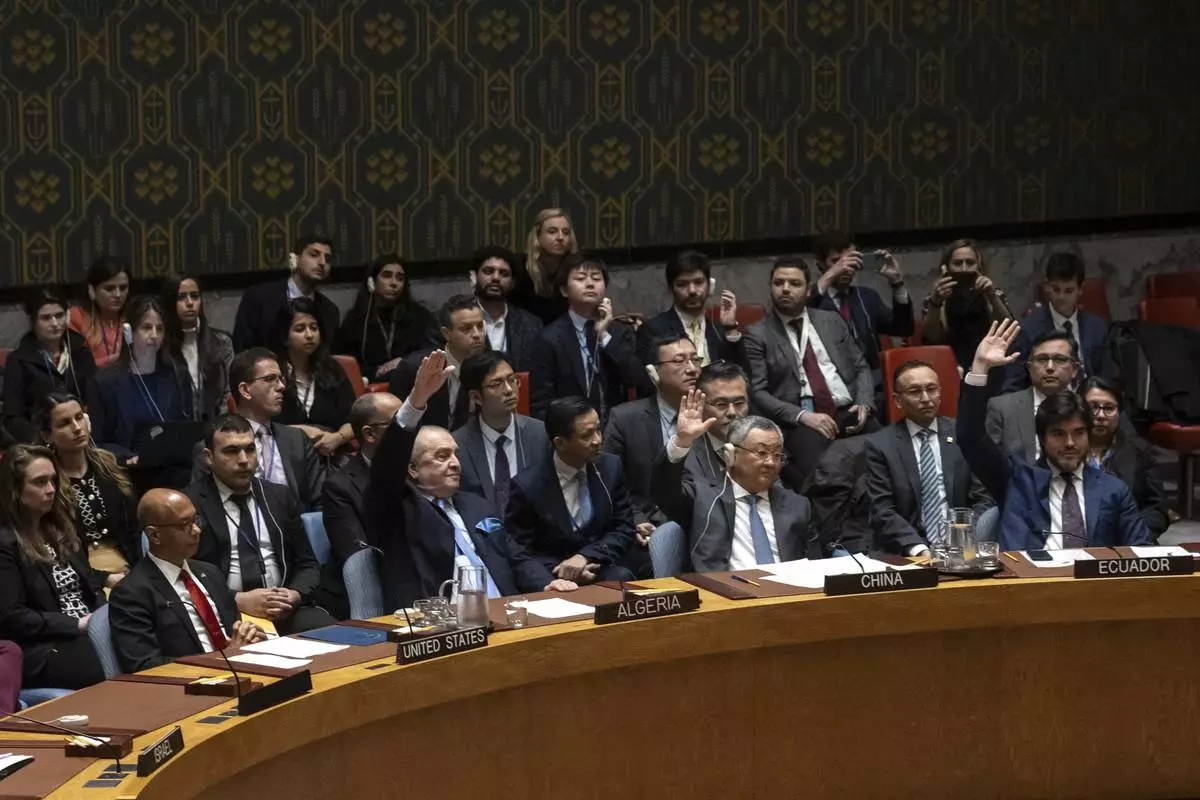
Representatives of member countries take votes during a Security Council meeting at United Nations headquarters, Thursday, April 18, 2024. (AP Photo/Yuki Iwamura)
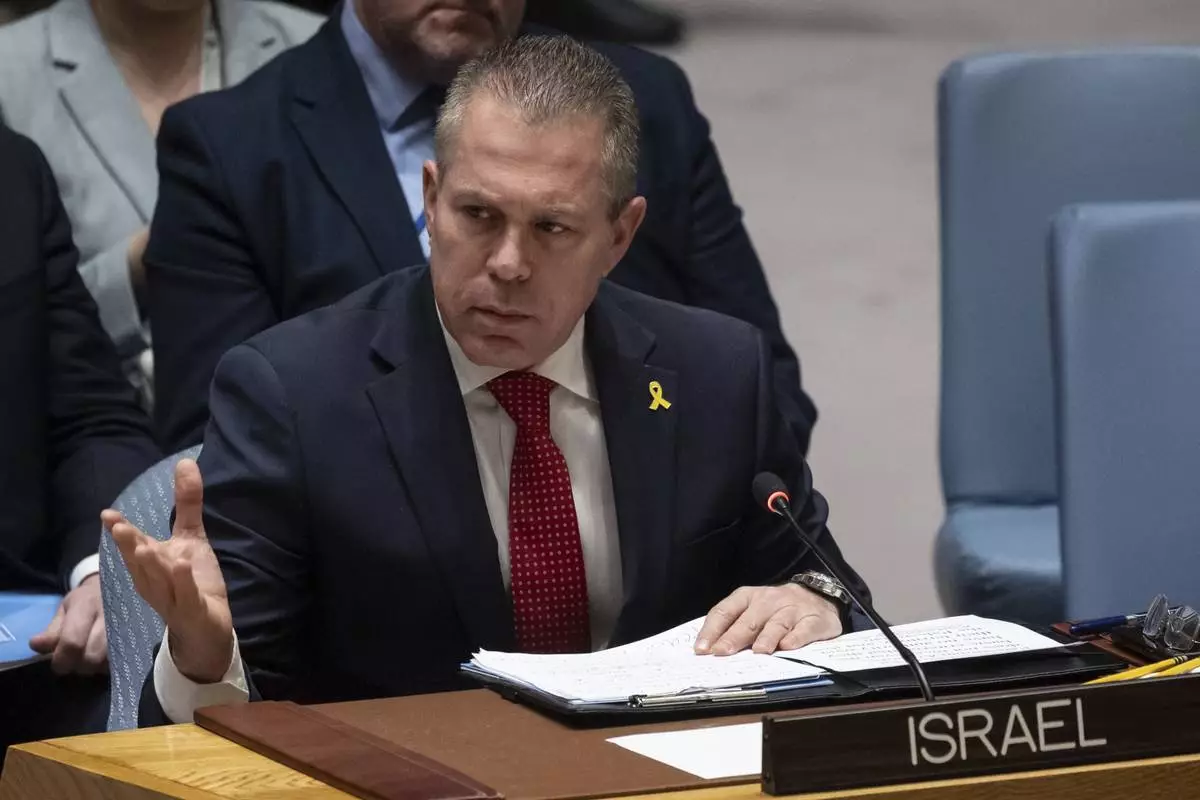
Israeli Ambassador to the United Nations Gilad Erdan speaks during a Security Council meeting at United Nations headquarters, Thursday, April 18, 2024. (AP Photo/Yuki Iwamura)
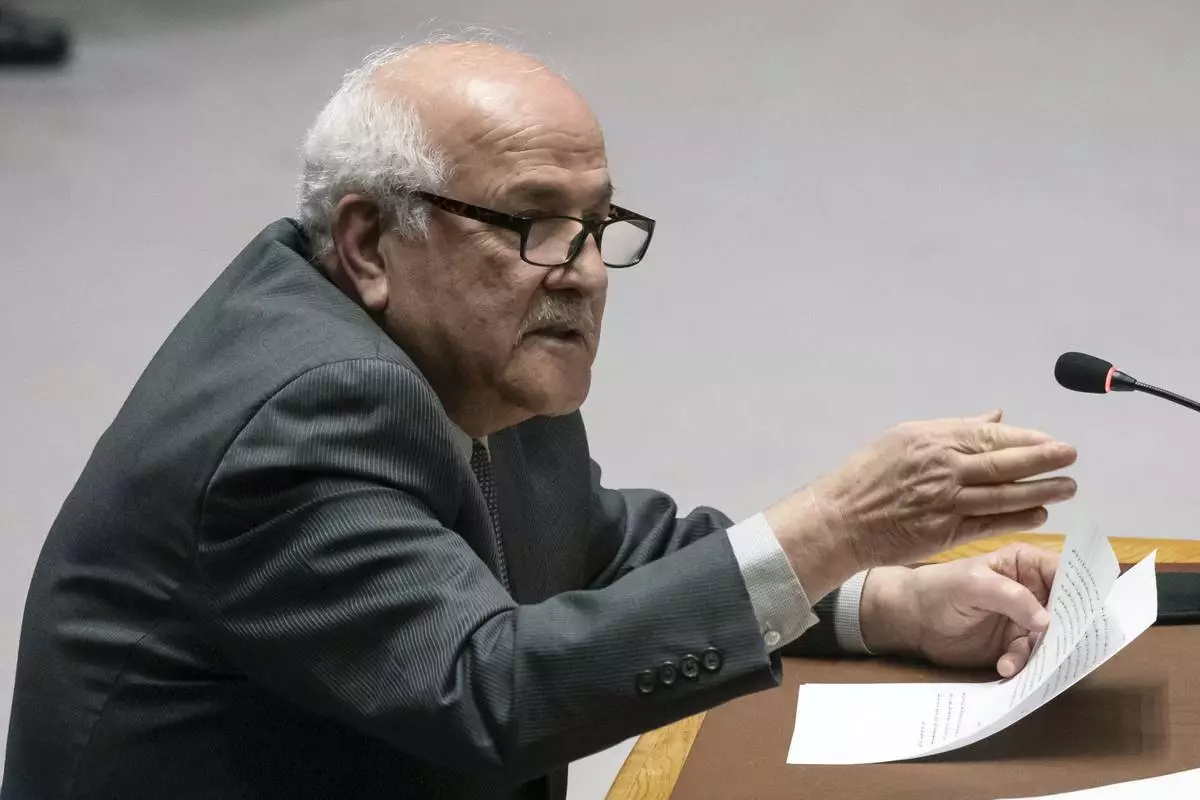
Palestinian Ambassador to the United Nations Riyad Mansour speaks during a Security Council meeting at United Nations headquarters, Thursday, April 18, 2024. (AP Photo/Yuki Iwamura)
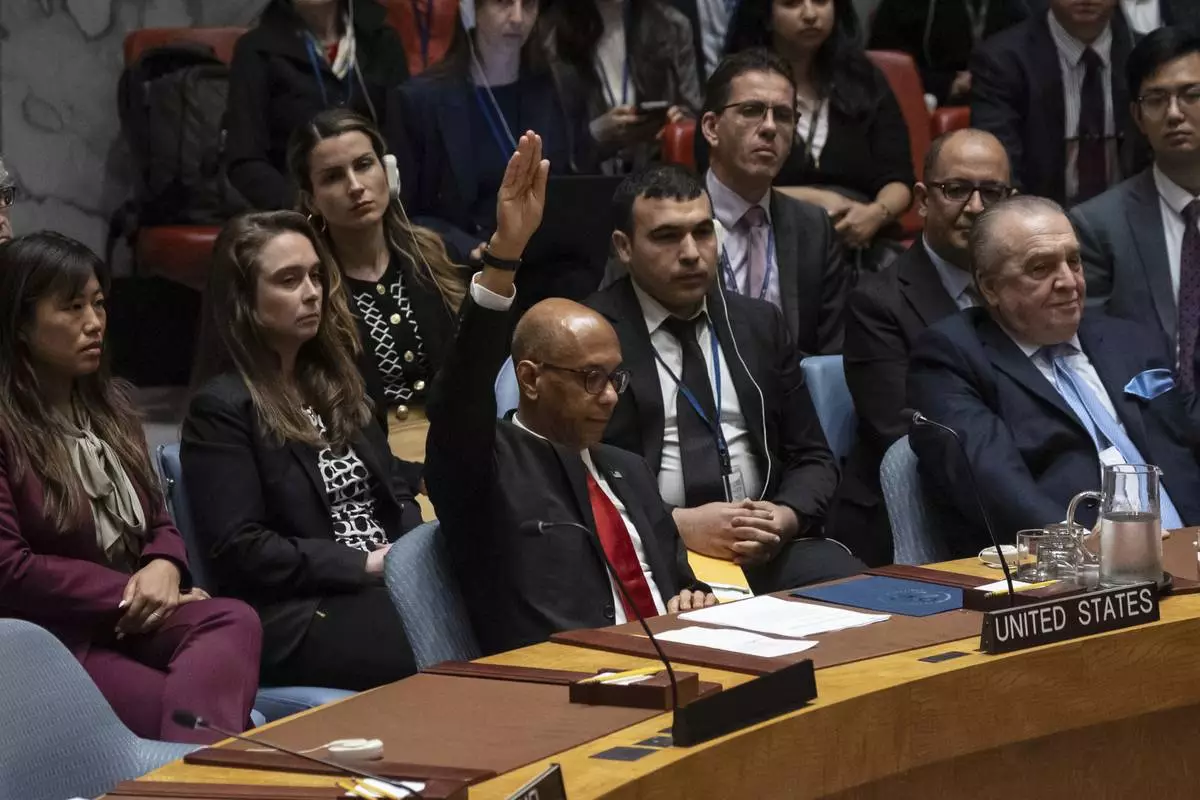
U.S. Deputy Ambassador Robert Wood votes against resolution during a Security Council meeting at United Nations headquarters, Thursday, April 18, 2024. (AP Photo/Yuki Iwamura)



















